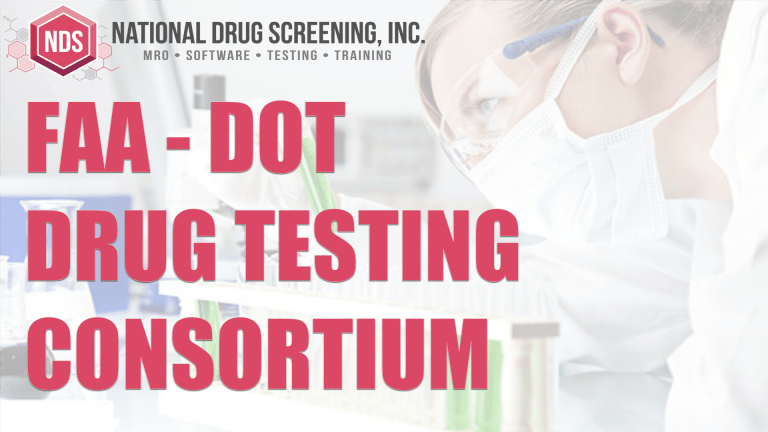We get questions all the time about FAA Drug Testing and the regulations required by the Department of Transportation (DOT) and the Federal Aviation Administration (FAA). FAA drug testing applies to drug testing of applicants and employees in the aviation industries including aircraft maintenance facilities. What this video to learn more about FAA required drug and alcohol testing.
You can Order Now a drug test required by the FAA.
Employers regulated by the Federal Aviation Administration (FAA) are required to have a DOT-FAA drug and alcohol testing program along with random testing in a stand-alone random testing pool or a consortium random testing pool. Employers that must comply with the FAA drug and alcohol testing requirements include:
| – Airlines – large and small – Air Tour Operators – Aircraft Maintenance Repair Stations – Helicopter Air Ambulance -Air Traffic Control Facilities not Operated by the FAA |
– Flight Schools – Flight Instructor Duties – Part 119 Certificate Holders – Part 121 Operators – Part 135 Operations – Part 145 Certificate holders |
Once you have determined that your company is required by the FAA to have a drug and alcohol testing program there are several steps to take to implement this program. The employees subject to the drug and alcohol testing are persons performing any of the safety-sensitive functions that are subject to the DOT/FAA drug and alcohol testing program, these include:
| – Flight crewmember – Flight attendant – Flight instruction – Aircraft dispatch – Aircraft maintenance/preventive maintenance |
– Ground security coordinator – Aviation screening – Air traffic control – Operations Control Specialist |
What is Required for FAA Drug Testing?
FAA regulated employers must have an Antidrug and Alcohol Misuse Prevention Program and the program must be registered with the FAA. What is required for compliance for the FAA drug and alcohol testing program?
- Appoint a Designated Employer Representative (DER)
- Implement a written drug and alcohol policy
- Education Program for employees and supervisors
- Pre-employment testing
- Random testing – stand alone or consortium random pool
- Reasonable suspicion and post-accident testing
- Return to Duty and Follow Testing
- Removal of employees from safety sensitive positions after a refusal to test or a positive drug or alcohol test
Every Designated Employer Representative (DER) should have the knowledge and authority to make decisions about his or her aviation employer’s drug and alcohol testing program. The DER is responsible for educating employees, conducting drug and alcohol tests, making sure the program complies with DOT/FAA regulations, and maintaining all documentation. National Drug Screening offers DER training.
National Drug Screening provides services for employers and DER’s to implement complete programs that will provide compliance with DOT-FAA’s Drug and Alcohol Testing regulations. National Drug Screening is a Consortium/Third-Party Administrator (C/TPA); a service agent that can implement all of the testing program components for an employer. These services include:
- DER Training
- Written FAA drug & alcohol testing policy
- Urine drug collections, as specimen collectors
- Breath alcohol testing, as breath alcohol technicians (BAT)
- Alcohol saliva testing, as screening test technicians (STT)
- SAMHSA Certified Laboratory
- Medical review officer (MRO) functions
- Random Testing Pool or Consortium Pool
- Recordkeeping and Reports
- Substance abuse professional (SAP) functions
- Employee Education and Supervisor Training
- Audit assistance
- Ongoing Consultation
Is National Drug Screening an approved FAA consortium?
The FAA no longer reviews or approves drug and alcohol testing programs for employers or C/TPAs. Employers certify their compliance when they sign the drug and alcohol testing paragraph (A449) in their Operations Specifications or when they register their program with the FAA Drug Abatement Division. C/TPAs do not submit documentation to the FAA. Consequently, an employer’s or C/TPA’s claim that it is “FAA-approved” is no longer valid. National Drug Screening does have experience with the FAA Drug & Alcohol Testing Programs since 1993.
When is a DOT post-accident drug and alcohol test required under FAA regulations?
The FAA definition of accident requiring testing: Accident means an occurrence associated with the operation of an aircraft which takes place between the time any person boards the aircraft with the intention of flight and all such persons have disembarked, and in which any person suffers death or serious injury, or in which the aircraft receives substantial damage. Testing must occur if employee’s performance either contributed to the accident or cannot be completely discounted as a contributing factor of the accident. The decision not to test an employee must be based on a determination, using the best information available at the time of the determination; that the employee’s performance could not have contributed to the accident.
Drug and alcohol testing of safety-sensitive aviation employees helps protect public safety and keep our skies safe. The DOT drug and alcohol testing program is a critical element of the Department of Transportation’s safety mission. Employees working in the transportation industry have an awesome responsibility to the public and we cannot let their performance be compromised by drugs or alcohol. The bottom line is safety.







